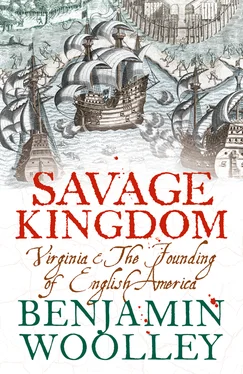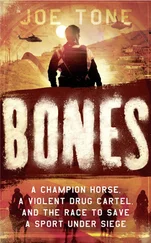By August, each man was receiving fewer than five hundred calories in his daily ration, and the result was a lethal combination of rampant disease and seething discontent. Rumours began to spread that some of the gentlemen, in particular the suspiciously healthy Wingfield, were hoarding private supplies. There was talk of the council hiding a stash of oil and alcoholic drink, and of the councillors’ ‘privates’ or favourites getting preferential treatment. One of the gentlemen, Jehu (or John) Robinson, was accused by Wingfield of plotting to seize the shallop and escape with associates to Newfoundland.
As the death toll began to rise, it became clear that social status provided little protection. Percy kept a doleful muster of the dead for those summer months, and it makes solemn reading: John Asbie, the first casualty, was followed two days later by George Flower, gentleman, who died ‘of the swelling’. Next was William Brewster, ‘of a wound given by the savages’, who was buried on 11 August.
August 14 was one of the worst days. Francis Midwinter, gentleman, and Edward Morris, ‘corporal’, died ‘suddenly’, and Jerome Alicock, the settlement’s standard-bearer, was dispatched by a ‘wound’. A skeleton with a bullet-shattered shin was dug up at Jamestown nearly four hundred years later, raising speculation that it may have been Alicock. Another candidate is the following day’s casualty: Stephen Calthorp, the man who had been accused of instigating the ‘intended and confessed mutiny’ involving Captain Smith. 20
Over the following three days, four more settlers died, including John Martin, son of councilman John Martin senior. Martin senior had been confined to his tent for some time, his various ailments making him too weak to leave his sickbed. But bitterness over the death of his child stirred him into action, and he accused Wingfield of ‘defrauding’ his son of the rations he needed to survive.
A day later, Drew Pickhouse, an impoverished former Sussex MP, followed the others into a makeshift grave. He had hoped to find good fortune abroad, having lost his estate at home following a legal dispute with a local aristocrat. He had left behind a wife and eleven children, presumably in rented accommodation. They would not learn of his and their fate for another eleven months. 21
A two-day respite did not prepare the settlers for the most distressing death of all: that of Captain Bartholomew Gosnold on 22 August, after three weeks of illness. Just before Newport had taken his leave of the settlement to return to England, President Wingfield had confided that he feared only two rivals taking over the presidency, that ‘ambitious spirit’ Archer, who ‘would if he could’, and Gosnold, who was so ‘strong with friends and followers’ he ‘could if he would’. Now he could not, depriving the settlers of the one man who seemed to command the confidence and respect that might lead them out of their troubles and miseries.
The next day, flocks of birds burst into the air as the boom of Jamestown’s huge culverins saluted Gosnold’s burial. He was interred with full military honours in a grave next to the river. A week later, Thomas Studley, the ‘cape merchant’ responsible for trade with the Indians, followed him.
The gloom lifted briefly when a ‘boy’, one of the ‘renegades’, was returned by the Paspahegh chief, with ‘the first assurance of his peace with us’. But it was not enough to prevent the council’s long-expected disintegration.
Under the stress of malnutrition, surviving council members began to argue violently with one another, as the conviction formed that there was a saboteur in their midst. All the suspicions and sectarianism that they had thought they had left behind them, suddenly and violently erupted in the midst of their misery.
Kendall was the first to be accused. It somehow emerged that he was a spy who had consorted with Sir William Stanley, a renegade English captain who had switched to the Spanish side in the Low Countries campaign. Kendall’s remonstrations that he had been working undercover for Cecil, and revelations that there were others on the council who were doing the same, were not enough to save him from being arrested for such ‘heinous matters’. 22
Kendall’s incarceration failed to produce an improvement in conditions, and the hungry eye of suspicion began to glance around the remaining council members. It came to rest on the plump form of President Wingfield, who seemed to be surviving the privations of recent weeks suspiciously well. His regular refusal to attend Robert Hunt’s alfresco services also raised doubts about his religious loyalties. The other three active members of the council, John Ratcliffe, John Smith and John Martin, voted for him to be removed from the council. His replacement as president, Ratcliffe, then arrested him for a list of crimes against the colony carefully tabulated by Gabriel Archer, who was still smarting at his own exclusion from the council. Wingfield was swiftly tried, and confined to the pinnace following the inevitable sentence of guilt.
But with each allegation, the paranoia intensified rather than diminished, and now a wave of rumours about Ratcliffe spread through the camp. Old questions about his unexpected selection as a commander of the fleet, and nomination to the council, began to take on a new significance. Who was this man who had so skilfully manoeuvred himself into such a powerful position? Where did he come from? Was he the Ratcliffe who, like Kendall, had acted as a spy in the Low Countries, penetrating, or perhaps being a member of, a powerful Catholic cell? Or was he the Ratcliffe who had been imprisoned in the Tower alongside Guy Fawkes following the Gunpowder Plot? Or the Ratcliffe who was a close friend of Cecil’s cryptographer and secretary Richard Percival? 23
Kendall, who in the chaos of the camp had manage to get access to other members of the council, had his own scurrilous answers to such questions, and by sharing them, hardened speculation that it was Ratcliffe who, all along, was the source of their sorrows.
A group of men, Percy and Smith among them, began to agitate for Ratcliffe’s removal. They proposed that the blacksmith James Read, who had access to the pinnace to maintain the metal fittings, approach Wingfield to see if he would back a plot to restore him to the presidency.
Ratcliffe learned of these intrigues, and gave Read a public thrashing for his ‘misdemeanour’. The smith, a qualified craftsman rather than a manual worker, considered someone of his status deserved more respectful treatment, and ‘offered’ to strike the president with his sledgehammer in return.
Once again, the rotting canvas of the settlement’s tents became the walls of a makeshift courtroom, and the stump of a tree the judge’s bench, as Read was tried for mutiny. He was found guilty and sentenced to death.
Permanent gallows were among the many fixtures of a settled community that the company still lacked, so a rope was tied to the branch of a tree and a ladder propped against the trunk, to be kicked away once the noose was around the neck of the condemned. When it came to carrying out the sentence, the blacksmith was naturally ‘very obstinate’, and put up a fight. Finally, he was forced up the ladder, where ‘he saw no other way but death with him’, and became ‘penitent’. He begged for a word with Ratcliffe regarding a private matter.
Ratcliffe granted his request, and the smith revealed to him details of Kendall’s involvement in a plot to restore Wingfield. Ratcliffe granted Read a pardon, and, for reasons yet to be disclosed to the rest of the company, ordered Kendall’s immediate arrest and confinement aboard the pinnace, alongside Wingfield.
In the midst of this turmoil, Smith replaced the late Thomas Studley as cape merchant. In his view, this put him in charge of dealing with the Indians, and eager to escape the broils tearing the company apart, he set off on a number of expeditions up the James, to trade for fresh supplies. Even Wingfield was impressed with the captain’s vigour and dedication to the task, which at this time of direst need ‘relieved the colony well’.
Читать дальше












